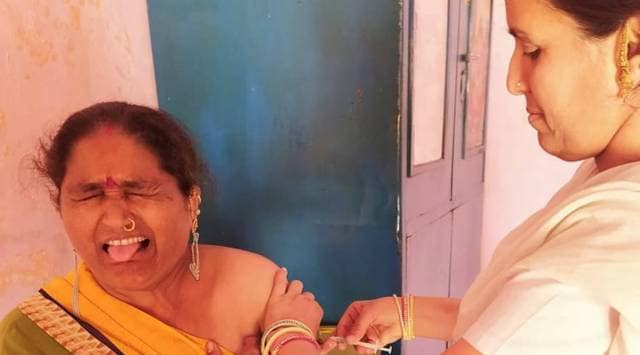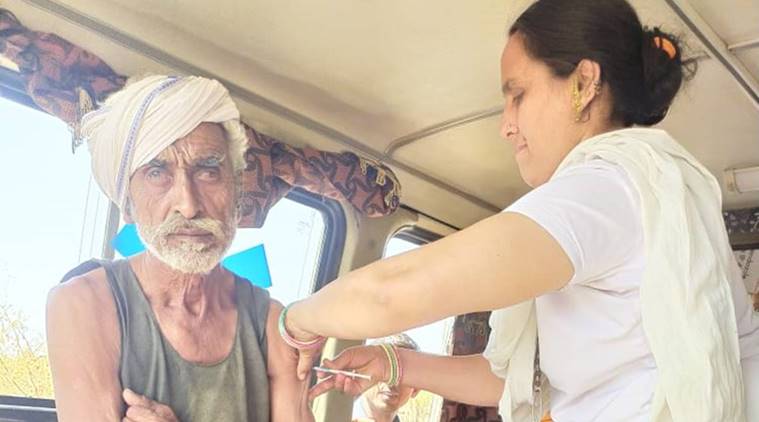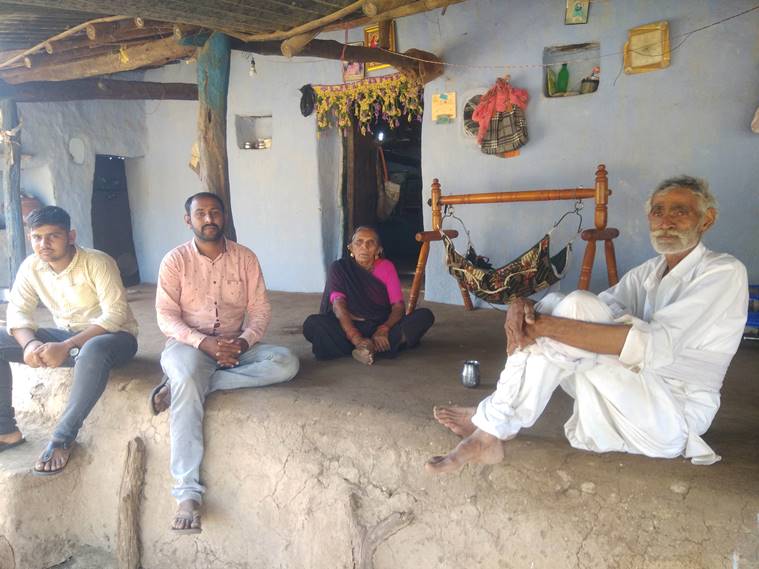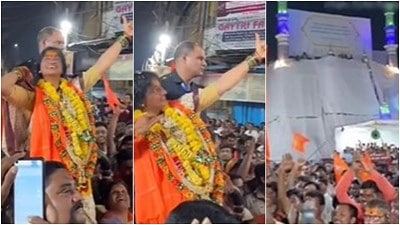- India
- International
Gujarat: Night sessions, awareness drives in Gir nesses but Covid vaccination slow
Many among the cattle-herding community of maldharis that lives in the isolated colonies called ness, deep inside the Gir forest, are reluctant to take the Covid-19 vaccine even as the state health officials are making special arrangements to cover them under the inoculation drive.
 A maldhari woman being administered Covid-19 vaccine at a ness inside Gir forest. (Gujarat State Health Department)
A maldhari woman being administered Covid-19 vaccine at a ness inside Gir forest. (Gujarat State Health Department)SITTING UNDER a thatched roof structure supported by wooden trusses with no walls outside his mud house in Asundarali ness inside Gir forest, 65-year-old Rana Makwana talks about how he volunteered to get inoculated for Covid-19 when everyone else was reluctant.
His wife Lakshmi did not take the vaccine shot fearing “something” might happen and then “who would do the household chores?”. Neither has her brother Mamaiya Khambhaliya (63), who tells Makwana, “But what was the need? You don’t have coronavirus.” Makwana responds cheerfully how he has had three heart attacks and is diabetic.
 A maldhari being administered a shot of Covid-19 vaccine in a ness, inside Gir forest. (Gujarat state health department)
A maldhari being administered a shot of Covid-19 vaccine in a ness, inside Gir forest. (Gujarat state health department)
“Nothing has happened to me. There is nothing to be afraid of about that injection”, he says.
Many among the cattle-herding community of maldharis that lives in the isolated colonies called ness, deep inside the Gir forest, are reluctant to take the Covid-19 vaccine even as the state health officials are making special arrangements to cover them under the inoculation drive, given the former’s tough summer schedule, by launching mobile units and night shifts.
Makwana tells his brother-in-law, “A few days ago, a madam came in an ambulance to our ness and told us to take injections so that Covid-19 can’t touch us. There are around a dozen people in this ness who are above 60 years but no one was willing. So, I volunteered and I am hale and hearty till date.”

Makwana’s two elder sons and their wives have migrated to coastal villages in search of fodder and water for their herd of buffaloes and cows, and his youngest son transports milk from Asundarali ness to Ingorala village in Khambha taluka every day and thus the regular contact with the world outside Gir forest.
 The Mobile Health Unit of health branch of Gir Somnath district panchayat inside a ness, in Gir forest. (Gujarat state health department)
The Mobile Health Unit of health branch of Gir Somnath district panchayat inside a ness, in Gir forest. (Gujarat state health department)
Lakshmi says she might consider being inoculated when the health team visits next. “But I’ve not seen corona(virus). People with mobile phones keep talking about it, but I am convinced, the Almighty would protect me from it,” she says.
Health department staff say their task (to vaccinate the maldharis) is not easy. “For most part of the daytime, maldharis remain away from their ness, grazing their livestock and it is impossible to contact them as mobile phone network is not available inside forest. Therefore, we had to organise a vaccination session at night for maldharis of Bordi Timbo, Dalli and Rajgariya nesses three days ago,” Dr Janki Bhalala, the medical office of Jira primary health centre (PHC) in Amreli’s Dhari taluka, says. She adds 35 maldharis were vaccinated at the night session. So far, the district has reported 4110 cases and 41 deaths due to the virus.
In the neighbouring Gir Somnath district, the health department faces an issue of migration. “Lots of maldharis have moved out of the forest with their livestock in search of fodder and water and are no longer available at their listed addresses. So, it is impossible to achieve the 100 per cent target. Logistics is also an issue and to overcome it, we have assigned to our mobile health unit (MHU) at Tulsishyam the additional task of Covid-19 vaccination besides their regular job of providing OPD and routine immunisation services,” says Dr Harun Bhaya, the chief district health officer (CDHO) of Gir Somnath, whose team led the drive in Asundarali and Ghudjinjva nesses.
In Ghudjinjva, Amrabhai Najani (60) and Rambhai Loma took the lead in getting the Covid-19 vaccine. Bababen Jalpava, an elderly woman also took a dose of the vaccine and set an example for other maldhari women. “If the government spends so much to get the vaccine administered to us, we shouldn’t be afraid. We are Gadhvis who are known to organise dayras (concerts of folk music and literature) and talk about wisdom and good behaviour. What bravery would one talk about at such dayras if one is afraid of taking a dose of vaccine,” says Najani, who keeps himself updated by listening to news on the radio. His wife Janu, however, is afraid of the fever that follows and did not take the jab.
The Gir forest and other protected areas spread across Amreli, Junagadh, Gir Somnath and Bhavnagar districts is home to the world’s only population of wild lions outside Africa. Cases of novel coronavirus transmitting from humans to wild animals in captivity have been reported from the US and UK.
 Lakshmi Makwana with her brother Mamaiya Khambhaliya (extreme left) in Asundarali ness inside Gir forest. (Express photo)
Lakshmi Makwana with her brother Mamaiya Khambhaliya (extreme left) in Asundarali ness inside Gir forest. (Express photo)
Besides the dense human population on its periphery, the 1,413 square kilometres (sqkm) Gir National Park and Wildlife Sanctuary has around 10,000 maldharis and farmers living in 45 nesses and 14 forest settlement villages inside it.
Of the 674 lions counted last year, 329 were seen outside the protected forest areas, where human activity is intense. The districts of Gir Somnath and Bhavnagar have reported 2,853 and 6,879 cases of Covid-19, respectively, so far. The districts have reported 26 and 70 deaths respectively due to the virus. Junagadh district has reported 5,706 cases and 33 deaths
Deputy Conservator of Forests, Gir (east) division, Anshuman Sharma says that only one from his field staff got Covid-19 while he on leave and away to Junagadh a few months back and was given an extended leave.
“We tried initially to persuade people to come to a proper vaccination site outside the forest but no one would turn up. Therefore, we had to use the MHU (mobile health unit) and take the vaccine to the doorsteps of the forest dwellers,” Dr Ankita Kanani, medical officer (MO) of Fatsar PHC in Gir Somnath’s Gir Gadhda taluka says. Of the 322 maldharis identified as targeted beneficiaries, 176 had been vaccinated until Friday.
The vaccination for senior citizens and those above 45 years of age with comorbidities had started in Gujarat from March 1. “In some pockets, maldharis are resisting vaccination. Therefore, we conduct an awareness drive a day in advance. We are trying our best to ensure that all maldharis are vaccinated at the earliest,” says Dr Haresh Dahima, MO of Girgadhda taluka’s Jamvala PHC which covers 11 nesses in Gir (west) division.
Of late, with the maldhari children moving out of the forest for education or work, the community’s interaction with the outside world has increased, says Dushyant Vasavada, the Chief Conservator of Forests of Junagadh wildlife circle. Health officers of Amreli and Gir Somnath districts confirm isolated cases of Covid-19 have been reported from nesses. “Around 15 to 20 staff members, including me, have contracted the virus and have recovered, but the wildlife is safe so far. The forest department staff is 18th on the government’s priority list for Covid-19 vaccination. The maldharis are a small community, who are socially distanced in any case,” Vasavada says.
Amreli District Collector Ayush Oak, however, says, “Given the sensitivity, we initially had plans to treat staff of the forest department on field duty in Gir (east) division as frontline workers and vaccinate them and maldharis living inside forest on priority. But we couldn’t follow it through due to a change in priority by the government.” He adds that from April 1, when anyone above 45 years can be vaccinated, the field staff of forest department and the maldharis would be given a priority.
Apr 18: Latest News
- 01
- 02
- 03
- 04
- 05






































